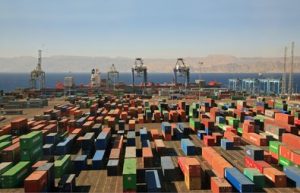Online Workshop Integrated and Sustainable Ports Africa
The aims of the workshop are twofold: to present and discuss the final outputs of the “Integrated and Sustainable Port Development in Ghana within an African Context” project and to canvas the opinions of participants on how they and others can use the developed framework for Sustainable Port Development.
- Description
- Programme
- Speakers
- Factsheet
-

The aims of the workshop are twofold:
to present and discuss the final outputs of the “Integrated and Sustainable Port Development in Ghana within an African Context” project, and
to canvas the opinions of participants on how they and others can use the developed framework for Sustainable Port Development.
At the workshop close, you will have a up-to-date understanding of the Sustainable Ports Development Framework, where you can find the outputs, how you can apply the framework, and who you can contact for advice or support.
The results of the workshop will be used in finalizing the project and tools so that the developed knowledge can be shared further.
The workshop will use an online platform like Teams
-
13:00 – 13:15 Opening and introduction
13:15 – 14:00 Sustainable Ports Development Framework – presentations and clarifying questions
14:00 – 14:15 Coffee/Tea/Leg-stretch break
14:15 – 15:00 Survey questions and discussion
15:00 – 15:15 Coffee/Tea/Leg-stretch break
15:15 – 15:45 Conclusion and closing
-
Tiedo Vellinga (TU Delft) – Project coordinator
Kwasi Appeaning Addo (U Ghana) – Ghana research coordinator
Jill Slinger (TU Delft) – Research coordinator and stakeholder-inclusive design
Heleen Vreugdenhil (TU Delft and Deltares) – Governance
Wiebe de Boer (TU Delft and Deltares) – Ecosystem-based port design
Liselotte Hagedoorn (VU Amsterdam) – Welfare effects of port designs
Edem Mahu (U Ghana) Ecological effects of port development
Daan Rijks (Boskalis) – Chairman of the Advisory Board for Sustainable Ports in Africa.
-
Towards Integrated and Sustainable Ports Africa
Ports provide an essential link to the world market, enabling countries to trade their goods and strengthen their economies. However, the global and regional benefits of port developments do not always translate into benefits to local stakeholders. There is often a mismatch between the positive global and regional effects of port development and the impacts (dis-benefits) that can be experienced locally. Port development requires a paradigm shift from a conventional economic and engineering-oriented approach to a stakeholder-inclusive and environmentally, economically, and socially integrated approach to become sustainable.
The research project “Integrated and Sustainable Port Development in Ghana within an African Context” learned how to develop integrated and sustainable African ports that meet economic, social, and environmental needs now and in the future. The Port of Tema, which has evolved from a small fishing village to Ghana’s leading industrial centre and seaport in the last decades, formed the focal case study of the research. The research was inspired by the lessons learned from the new expansion of the Port of Rotterdam, an outspoken example of a value based, stakeholder inclusive, ecosystem-based and adaptive approach.
The research project, funded by the Dutch research Council, is carried out by a consortium comprising the University of Ghana, Delft University of Technology, the VU Amsterdam, Wageningen University, Deltares, UNESCO IHE-Delft and the Netherlands African Business Council and is supported by NGO’s and private sector companies. The project started in 2016 and is characterized by an interdisciplinary approach, combining the engineering, ecological, economic and governance aspects of port development.
The project results include an ‘Africa-specific’ design framework and design tools to integrate and optimise the environmental, economic, and public benefits of ports. An ‘action based’ research approach has been applied together with demand driven knowledge development, meaning that users are in direct contact with the researchers. Multi-stakeholder workshops and interviews with stakeholders to hear their stories were key aspects.
Ecosystem-based alternatives for the design of a seaport’s marine infrastructure were identified and evaluated for the case of Tema port expansion in Ghana. And to learn from past port engineering practices, a study was done to map the sandy beach evolution around seaports at the scale of the African continent. The results are useful for developing beach maintenance strategies for existing seaports and to support planners and engineers in minimizing long term coastal impacts of port expansions and new port developments in Africa in the future.
Information can be found on the project website: www.sustainableportsafrica.com


